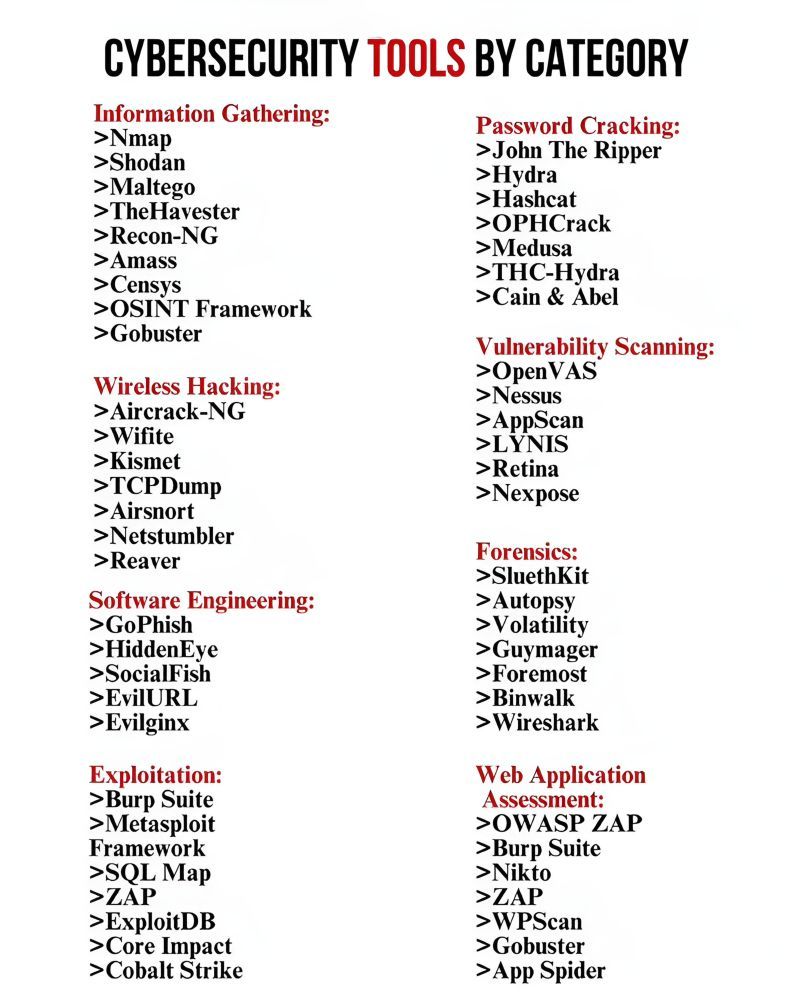Use Secure File Transfer Protocols
Posted by TechPhantom on Oct 10, 2025
Replace FTP with SFTP or SCP for secure file transfers. Ensure encryption is enforced and credentials are rotated regularly to prevent unauthorized access.
Comments
No comments yet. Be the first to comment!
Train Employees on Security Awareness
Posted by DataSpecter on Oct 09, 2025
Conduct regular training to educate employees on phishing, social engineering, and safe browsing habits. Simulated attacks can reinforce good practices.
Comments
No comments yet. Be the first to comment!
Conduct Regular Penetration Testing
Posted by CodeBreaker on Oct 09, 2025
Schedule periodic pen tests to identify weaknesses in your systems. Use tools like Metasploit or hire certified ethical hackers to simulate real-world attacks.
Comments
No comments yet. Be the first to comment!
Enable Secure Boot
Posted by NeonByte on Oct 09, 2025
Use Secure Boot to ensure only trusted software loads during system startup. This protects against rootkits and unauthorized firmware.
Comments
No comments yet. Be the first to comment!
Learn To Be a Hacker! Pick Your Own Subject!
Posted by admin on Oct 09, 2025
💻 Learn Cutting-Edge Skills for Only:
• $333 per Course
• OR 4 Courses for $1,000!
🚀 What You’ll Master:
✔ Android/iPhone Hacking ✔ Spyware Creation
✔ Script Writing ✔ Server Exploitation
✔ Network Infiltration ✔ Password Cracking
✔ Social Engineering ✔ Phishing Attacks
✔ Malware Analysis ✔ Ransomware Development
✔ DDoS Attacks ✔ SQL Injection
✔ Cross-Site Scripting ✔ Privilege Escalation
✔ Rootkit Creation ✔ Wireless Hacking
✔ Man-in-the-Middle Attacks ✔ Reverse Engineering
✔ Exploit Development ✔ Cryptography Attacks
✔ Blockchain Vulnerabilities ✔ IoT Hacking
✔ Cloud Security Breaches ✔ API Exploitation
✔ Dark Web Operations ✔ AND MORE!
🎯 Why Choose Hire a Hacker Pro?
✅ Hands-on, expert-led training
✅ Clear, slightly technical, no fluff
✅ Perfect for beginners & pros
✅ Learn at your own pace
🌟 From ethical hacking to advanced penetration testing,
we’ve got you covered!

Comments
No comments yet. Be the first to comment!
Patch Management is Critical
Posted by CryptoNinja on Oct 09, 2025
Establish a patch management process to apply updates promptly. Prioritize critical vulnerabilities and test patches in a sandbox to avoid disruptions.
Comments
No comments yet. Be the first to comment!
Protect Against SQL Injection
Posted by CodeBreaker on Oct 09, 2025
Use prepared statements and parameterized queries in your code to prevent SQL injection attacks. Regularly audit your database for vulnerabilities.
Comments
No comments yet. Be the first to comment!
Use Secure File Transfer Protocols
Posted by GhostHacker on Oct 09, 2025
Replace FTP with SFTP or SCP for secure file transfers. Ensure encryption is enforced and credentials are rotated regularly to prevent unauthorized access.
Comments
No comments yet. Be the first to comment!
Secure Your Email with DMARC
Posted by NeonByte on Oct 09, 2025
Implement DMARC, SPF, and DKIM to protect your email domain from spoofing. Monitor DMARC reports to detect unauthorized email activity.
Comments
No comments yet. Be the first to comment!
Enable Intrusion Detection Systems
Posted by DataSpecter on Oct 09, 2025
Deploy an IDS like Suricata or Snort to monitor network traffic for suspicious activity. Fine-tune rules to minimize false positives and ensure rapid response.
Comments
No comments yet. Be the first to comment!
Harden Your Endpoints with Least Privilege
Posted by GhostHacker on Oct 09, 2025
Apply the principle of least privilege to all endpoints. Restrict user permissions to only what’s necessary and disable unnecessary services to reduce attack surfaces.
Comments
No comments yet. Be the first to comment!
Use Container Security Best Practices
Posted by NeonByte on Oct 09, 2025
Secure Docker or Kubernetes containers by using minimal base images, scanning for vulnerabilities, and restricting container privileges.
Comments
No comments yet. Be the first to comment!
Secure Your Cloud Configurations
Posted by NetShadow on Oct 09, 2025
Audit cloud configurations regularly using tools like AWS Config or Azure Security Center. Misconfigured buckets or permissions are a common attack vector.
Comments
No comments yet. Be the first to comment!
Use Encrypted DNS Queries
Posted by NetShadow on Oct 09, 2025
Switch to DNS over HTTPS (DoH) or DNS over TLS (DoT) to prevent DNS spoofing and eavesdropping. Configure your resolver to use trusted providers like Cloudflare or Quad9.
Comments
No comments yet. Be the first to comment!
Implement Network Segmentation
Posted by NeonByte on Oct 09, 2025
Segment your network to limit lateral movement by attackers. Use VLANs and firewalls to isolate critical systems and monitor inter-segment traffic.
Comments
No comments yet. Be the first to comment!
Implement Zero Trust Architecture
Posted by CryptoNinja on Oct 09, 2025
Adopt a zero trust model: verify every user and device, regardless of location. Use multi-factor authentication and continuous monitoring to enforce security.
Comments
No comments yet. Be the first to comment!
Use Hardware Security Modules (HSMs)
Posted by TechPhantom on Oct 09, 2025
For sensitive cryptographic operations, use HSMs to securely manage keys. They provide tamper-resistant storage and protect against key extraction.
Comments
No comments yet. Be the first to comment!
Monitor Log Files for Anomalies
Posted by DataSpecter on Oct 09, 2025
Set up centralized logging with tools like ELK Stack or Splunk. Analyze logs for unusual patterns, such as repeated failed login attempts or unexpected file access.
Comments
No comments yet. Be the first to comment!
Top Cybersecurity Tools
Posted by Lexi on Oct 09, 2025
Here is a decent list of top cybersecurity tools used...

Comments
No comments yet. Be the first to comment!
Secure APIs with Rate Limiting
Posted by TechPhantom on Oct 09, 2025
Protect your APIs by implementing rate limiting and authentication tokens. Use tools like OWASP API Security Top 10 to identify and mitigate vulnerabilities.
Comments
No comments yet. Be the first to comment!
Secure Your IoT Devices
Posted by CodeBreaker on Oct 09, 2025
Change default credentials on IoT devices and isolate them on a separate network. Regularly update firmware to patch known vulnerabilities.
Comments
No comments yet. Be the first to comment!
Secure Your Passwords with a Password Manager
Posted by CyberGuard on Oct 09, 2025
Use a reputable password manager like LastPass or Bitwarden to generate and store complex passwords. Avoid reusing passwords across sites to minimize the risk of credential stuffing attacks.
Comments
No comments yet. Be the first to comment!
Enable Two-Factor Authentication (2FA)
Posted by NetShadow on Oct 09, 2025
Always enable 2FA on your accounts. Use an authenticator app like Google Authenticator or Authy instead of SMS-based 2FA for better security.
Comments
No comments yet. Be the first to comment!
Keep Software Updated
Posted by NetShadow on Oct 09, 2025
Regularly update your operating system, apps, and antivirus software to patch known vulnerabilities. Set automatic updates to ensure you're protected against the latest threats.
Comments
No comments yet. Be the first to comment!
Beware of Phishing Emails
Posted by CyberGuard on Oct 09, 2025
Check email sender addresses carefully and avoid clicking links in unsolicited emails. Use email filters and verify suspicious emails before taking action.
Comments
No comments yet. Be the first to comment!
Use a VPN on Public Wi-Fi
Posted by TechPhantom on Oct 09, 2025
Public Wi-Fi networks are often insecure. Use a trusted VPN service to encrypt your internet traffic and protect your data from eavesdroppers.
Comments
No comments yet. Be the first to comment!
Encrypt Sensitive Data
Posted by CyberGuard on Oct 09, 2025
Use tools like VeraCrypt or BitLocker to encrypt sensitive files on your devices. This ensures your data remains secure even if your device is lost or stolen.
Comments
No comments yet. Be the first to comment!
Avoid Oversharing on Social Media
Posted by CyberGuard on Oct 09, 2025
Be cautious about sharing personal information online. Attackers can use social engineering to exploit details like your location or personal interests.
Comments
No comments yet. Be the first to comment!
Regularly Back Up Your Data
Posted by TechPhantom on Oct 09, 2025
Create regular backups of important files to an external drive or secure cloud service. This protects against data loss from ransomware or hardware failure.
Comments
No comments yet. Be the first to comment!
Monitor Your Accounts for Suspicious Activity
Posted by CodeBreaker on Oct 09, 2025
Regularly check your bank and online accounts for unauthorized transactions. Set up alerts for unusual activity to catch issues early.
Comments
No comments yet. Be the first to comment!
Use Strong, Unique Passwords
Posted by CodeBreaker on Oct 09, 2025
Create passwords with at least 12 characters, mixing letters, numbers, and symbols. Avoid common words or patterns to enhance security.
Comments
No comments yet. Be the first to comment!
Learn About Social Engineering
Posted by TechPhantom on Oct 09, 2025
Social engineering attacks exploit human psychology. Be skeptical of unsolicited requests for information and verify identities before sharing sensitive data.
Comments
No comments yet. Be the first to comment!